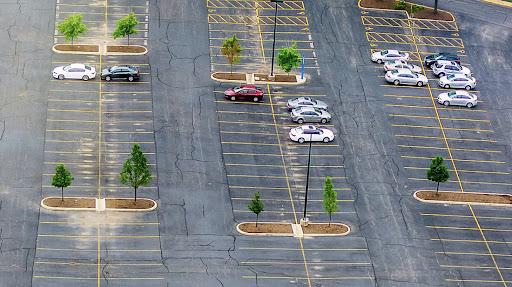A line of shiny, metallic vehicles stretches in lockstep along Bourbon Street under the buzzing of lamplit insects. A vehicular graveyard where make, model and license plate chisel the inscriptions on their automobile tombstones. Elsewhere on the gray-black pavement and white-lined lot, motorist cubicles organize the dormant cars of students with the means of rent for their automobiles, signified by their circular insignia.
Amidst Transylvania University admitting nearly 300 first-year students this Fall, campus space–and not just parking–has become increasingly stretched. In an interview with FOX56, Transylvania Director of Housing and Residence Life Keith Jones II, reported “more than 600 students” as living on campus this year, adding that, “right now we expect to be at about maximum capacity.” This, naturally, impacts the stress on the Transylvania Student Life team but also affects the number of parking spaces available to the entire campus community.
Cafeteria workers, staff, students, university guests, parents, and others visiting campus all struggle to find parking under the current implementation of the parking pass system. One anonymous student attempted to park in the Bourbon Street lot but was blocked by a student physically standing in the space to reserve for themselves. Another anonymous student questioned what value the additional $100 added to the parking pass; no parking was added, no parking lots changed restrictions, and the problem of finding parking remains a perennial concern on campus.
The tempting answer to the issue of parking may be to ‘just build more parking.’ Some members of the administration have contemplated turning the green space next to the triplex housing building on the corner of W. Fifth and Bourbon. If students with cars cannot find spots, the theory purports, then add more parking spots to accommodate those vehicles. This, however, is not the solution.
According to the Chicago Metropolitan Agency for Planning (CMAP), “building additional parking without managing the existing supply can induce driving and increase the demand for even more parking.” This increased demand for parking arises from the perceived availability and normalcy of automobile usage on campus. Additionally, according to academic research, parking lots contribute to environmental challenges by using massive quantities of energy, polluting rainwater drainage to natural water systems, and reflecting sunlight back into the atmosphere thereby intensifying the urban heat island effect. In effect, building more parking spaces harms both the environment and frustrates automobile users.
According to a DPS officer and Dean of Students, Michael Covert, Transylvania plans to use the green space next to the Bourbon Street lot for additional housing. This new development is projected to undergo construction many years in the future and will house ‘independent living’ with apartment-esque suites. The new extension of housing will, naturally, require more parking spaces for students planning on living ‘independently.’ This plan of development, without regard to the thought of parking, proliferates availability and thus allows a greater volume of car parking acceptance at Transylvania.
Some students, such as Alice Beatty, a member of the Conservation Action Committee (CAC) take the approach that, whatever happens, it should be to the effect of lessening car dependency on campus. In fact, incentives for more environmental transportation are readily available on campus, with the student handbook stating that “students are encouraged to bring a bike with them to campus as a model of sustainable transportation,” because, “bicycle permits are free.” Additionally, Transylvania DPS offers transportation to and from certain locations–also free of charge.
One DPS officer even offered the solution that, “There is plenty of parking available.” The Mitchell Fine Arts Center, Campbell, and Kenton lots often have open spots for students to park. The issue, from his point of view, seemed to be that students have parking but choose to not use the spaces which require crossing N. Broadway. To students’ credit, crossing N. Broadway can be a risk with the volume of traffic.
Moving forward, perhaps a renewed interest in the Transylvania Sustainability Initiative is required. A part of sustainable growth for Transylvania means addressing the automobile-centered campus, planning for a sustainable future, and addressing the environmental impact of Transylvania right now. A system of assigned parking to fully use spaces that go unused could be implemented. Maybe a system similar to other universities, such as Auburn and Vanderbilt, that do not allow first-year students to park on campus. Even a revision to the tiered parking system–one which reserves closer spaces for cafeteria and maintenance workers–could also be entertained. Whichever solution is the choice of the university, however, a change to the current system is needed.



